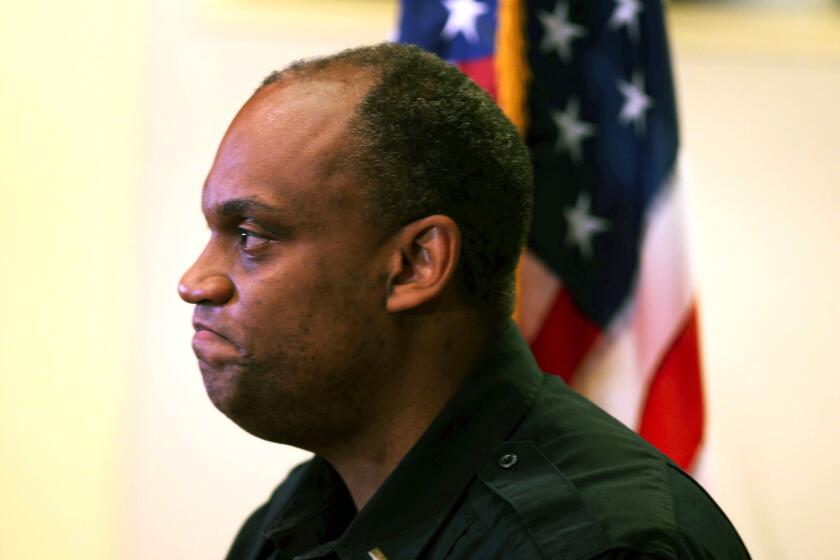Seattle’s first Black police chief quits, saying she’s unwilling to sacrifice diversity

- Share via
SEATTLE — When Carmen Best became Seattle’s first Black police chief in 2018, her appointment was hailed as a significant step forward in diversifying departments nationwide and helping one of the country’s whitest major cities work through some of its racial problems.
She quickly got to work recruiting. In 2019, the department hired 108 officers — the most in more than a decade — of whom a record 39% were people of color.
That effort has come to an abrupt end. Best announced Tuesday that she was retiring because she could not in good conscience implement the City Council’s decision to downsize the 1,400-person force by as many as 100 officers.
Under police labor contracts, the officers hired most recently are generally first in line to be laid off. The 55-year-old chief said at a news conference that it felt “very duplicitous” for the city to hire “the best and the brightest and the most diverse” only to quickly let them go.
A 28-year veteran of the force, Best went on to describe an email she received Monday from one of those recent hires, a Black man who wrote that he was “ecstatic” to be joining the department under her command.
“He is one of the people that will probably not keep a job here,” Best said. “And that, for me, I’m done. I can’t do it.”
Her departure is an ironic twist for a city that views itself as a beacon of liberal politics at a moment when the country is grappling with questions of how to curb police brutality and eliminate institutional racism.
In Portland, Ore., the chief, a white woman, resigned to give a Black man the job. In Seattle, authorities boarded up and vacated a police precinct.
The Seattle Police Department has a troubled history on race. The force has long been less diverse than the city, which is about two-thirds white.
In 2012, after a federal investigation found a pattern of excessive use of force and biased policing, the city entered into a consent decree with the U.S. Department of Justice committing to improvements.
With Best at the helm of the department, the city hoped to be released from that agreement as soon as this year. Then, this June, Mayor Jenny Durkan, who had selected Best for the job, put those plans on hold amid the nationwide protests that broke out after the death of George Floyd in the custody of Minneapolis police.
As the demonstrations intensified in Seattle, the relationship between Best and elected city leaders began to deteriorate.
In early June, police vacated a police precinct in Seattle’s Capitol Hill neighborhood. It’s never been made clear who ordered the officers to leave, but Best has said she opposed the withdrawal.
Activists went on to declare six blocks around the precinct a “police-free” area, eventually naming it the Capitol Hill Occupied Protest zone.
The protesters called for cutting the city’s police budget by 50%, shifting funds to programs in Seattle’s historically Black communities and dropping charges against people arrested during the demonstrations.
By day, the zone resemble a street festival, but violence often erupted at night.
Best argued that tear gas, pepper spray, flash-bang grenades and foam-tipped projectiles were necessary to disperse crowds of protesters, some of whom were throwing objects at officers. But on June 15, the City Council took its lead from protesters and voted unanimously to ban police from using crowd-control weapons.
Two weeks later, after a series of shootings in the zone and mounting complaints from businesses, Best declared that “enough is enough.” Durkan issued an executive order to clear the area, and police reclaimed the precinct.
Best and the mayor embraced calls to rout out racism and injustice in city governance and “re-imagine” policing. But they balked last month when seven of the nine council members agreed to support a “road map” presented by activists who want to cut the police department budget — $409 million this year — in half.
The police union lobbied against cuts, and the chief and the mayor asked the City Council to hold off on changes.
But on Monday, the council voted to shrink the police department by as many as 100 officers through layoffs and attrition — far less than what the activists wanted but more than Best would tolerate. The council also voted to cut pay for the chief and her command staff.
At the news conference Tuesday, Best said her decision to step down Sept. 2 “is not about the money, and certainly isn’t about the demonstrators,” referring to a group of protesters who showed up at her house Aug. 1.
She called her job as chief “the dream of a lifetime.”
Asked what challenges she faced as a Black woman police chief, Best acknowledged that “there are very few African American women in this field, certainly not as chief.”
Just 4% of police chiefs in the nation were Black and 3% were women as of 2016, according to an October 2019 report from the U.S. Department of Justice.
“In many ways, I represent what the future can hold, so I’m very proud of that,” she said. “The challenge of being a police chief in America is great no matter who you are.”
Best was flanked by Deputy Chief Adrian Diaz, whom Durkan said she plans to appoint as interim chief. Asked how he would be able to make decisions on cutting officers, Diaz said he would have to move the department forward.
“These are going to be rough times,” Diaz said. “We’ve got to re-imagine public safety, and we’ve got to provide a safe and healthy community.”
Some City Council members expressed regret at Best’s departure, with Lisa Herbold calling it “a staggering loss” and Alex Pedersen saying he was “deeply saddened.” Business community members expressed dismay; Alicia Teel, spokeswoman for the Seattle Metropolitan Chamber of Commerce, said the council “chose divisive rhetoric over responsible governance, and it cost our city a respected leader.”
Durkan praised Best and said she had served as “a role model for every girl out there.”
“My heart is obviously heavy to lose her, and I will freely admit I wish she was staying,” she said.
Times staff writer Jaweed Kaleem in Los Angeles contributed to this report.
More to Read
Sign up for Essential California
The most important California stories and recommendations in your inbox every morning.
You may occasionally receive promotional content from the Los Angeles Times.












